Ian Melin-Jones
Kristin Israelsson leaves Rottneros AB
The Mill Director of Rottneros Mill, Kristin Israelsson, has decided to take up a position outside Rottneros and will therefore leave her position as Mill Director. Kristin has six months' notice and remains in full capacity during this period.
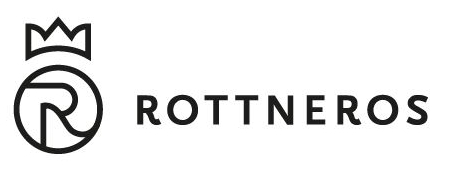 The recruitment of a new Mill Director for Rottneros Mill will begin immediately.
The recruitment of a new Mill Director for Rottneros Mill will begin immediately.
For more information please contact:
Lennart Eberleh, President and CEO, Rottneros AB, +46 (0)270 622 65, This email address is being protected from spambots. You need JavaScript enabled to view it.
Rottneros is an independent producer of market pulp. The Group comprises the parent company Rottneros AB, listed on Nasdaq Stockholm, and its subsidiaries Rottneros Bruk AB and Vallviks Bruk AB with operations involving the production and sale of market pulp. The Group also includes Rottneros Packaging AB, which manufactures fibre trays, and the wood procurement company SIA Rottneros Baltic in Latvia. The Group has about 300 employees and had a turnover of approximately SEK 2.3 billion in the 2018 financial year.
Kathy Buckman Gibson named Woman of the Year
Kathy Buckman Gibson was recognized as Woman of the Year by the Technical Association of the Pulp and Paper Industry’s (TAPPI’s) Women in Industry Division at its recent annual PaperCon conference.
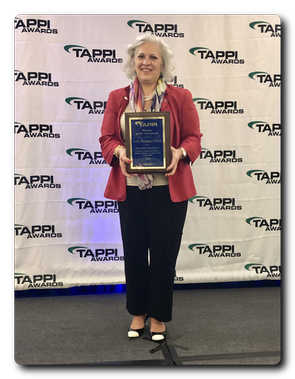 Kathy Buckman Gibson Buckman Gibson is a TAPPI Fellow and received the association’s Herman L. Joachim Distinguished Service Award in 2007. She has served as a Trustee of the TAPPI Foundation and is a past Board Member of TAPPI, PIMA (Paper Industry Management Association), and the Center for Paper Business Industry Studies (CPBIS). She also served on the Board of the Pulp and Paper Foundation of North Carolina State University.
Kathy Buckman Gibson Buckman Gibson is a TAPPI Fellow and received the association’s Herman L. Joachim Distinguished Service Award in 2007. She has served as a Trustee of the TAPPI Foundation and is a past Board Member of TAPPI, PIMA (Paper Industry Management Association), and the Center for Paper Business Industry Studies (CPBIS). She also served on the Board of the Pulp and Paper Foundation of North Carolina State University.
Buckman Gibson is an owner and Director of Buckman. She has been involved with the pulp and paper industry for more than 25 years while working at Buckman in various capacities including Chief Operating Officer, General Counsel and Chairman of the Board.
Currently Buckman Gibson is CEO and President of KBG Technologies, LLC, a joint venture between herself and Buckman established in 2018. KBG Technologies is a certified woman-owned business providing chemistries and smart technologies to the pulp and paper industry and water treatment market.
Buckman Gibson currently focuses her community efforts on expanding early childhood education and Pre-K in Memphis and Shelby County, Tennessee. She has also served in various leadership roles for National Girls Incorporated, United Way of the Mid-South, Mid-South Reading Alliance, the Women’s Foundation for a Greater Memphis, the National Civil Rights Museum and more.
About Buckman
Buckman is completely committed to helping our customers succeed, regardless of the challenges facing them, the industry they operate in or their location in the world. To fulfill that commitment, we surround our rigorously trained industry experts with the highest-quality chemicals, the latest smart technology and advanced data analysis. All focused on helping our customers’ operations improve productivity, increase profitability and ensure safety, compliance and sustainability. That’s more than chemistry. That’s Chemistry, connected.
About KBG Technologies
KBG Technologies believes the right chemistry can mean the difference between good and great results. Founded by Kathy Buckman Gibson, former chairman of the board of Buckman, KBG Technologies is a full-service distributor for Buckman as well as other chemical suppliers, providing personal customer service and a North American distribution network. As a certified woman-owned business, KBG brings a unique approach that not only helps facilities meet their profitability and efficiency goals, but also their diversity goals.
Pulpwood prices in North America were 5-10% higher in the 1Q/19 than the 1Q/18
Pulpwood prices in North America were 5-10% higher in the 1Q/19 than the 1Q/18, with prices in the US South having increased the most due to challenging weather conditions, as reported by the North American Wood Fiber Review
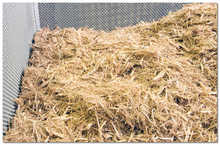 The winter weather impacted availability and costs for pulplogs and wood chips in both Canada and the US in late 2018 and early 2019, according to the North American Wood Fiber Review. Slowing lumber production throughout North America led to reduced supplies of residual chips and slightly higher prices in early 2019.
The winter weather impacted availability and costs for pulplogs and wood chips in both Canada and the US in late 2018 and early 2019, according to the North American Wood Fiber Review. Slowing lumber production throughout North America led to reduced supplies of residual chips and slightly higher prices in early 2019.
Seattle, USA. Prices for pulplogs and wood chips moved up slightly in the US in the 1Q/19 while they were unchanged or slightly lower in Canada, as compared to the 4Q/18, according to the latest issue of the North American Wood Fiber Review. For several regions in North America, the year began with higher fiber prices due to harvesting slowdowns after some inclement weather. In the US South Central and Southeast regions, there was particular demand for hardwood fiber, which resulted in an uptick in prices. These were also the regions that saw the highest quarter-to-quarter (q-o-q) increases on the continent in the 1Q/19.
US South
Pulpmills along the US Atlantic coast saw their wood fiber costs rise almost 10% over the past year both because of higher transportation costs and tighter log supplies due to difficult weather conditions. The harsh weather continued into the second half of 2018 as the region was hit with hurricanes and extreme rain. Hurricane Florence in the third quarter and Hurricane Michael in the fourth quarter led to wet ground conditions that slowed harvest operations and interrupted of the hauling of logs across the region.
With the tight supply of wood fiber, wood chip and pulplog prices in the 1Q/19 reached their highest levels in almost seven years in both in the South Central and Southeastern states.
Softwood sawlog prices remained unchanged in the 1Q/19 from the previous quarter and were practically the same as they were in 2017 and 2018.
US Northwest
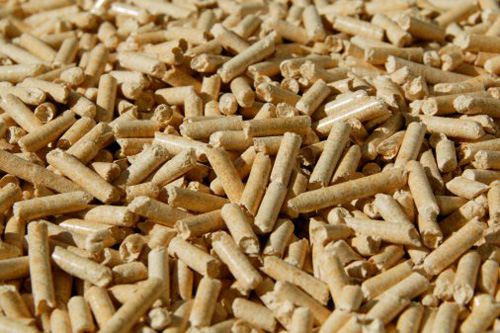 Prices for both wood chips and pulplogs in the US Northwest increased by a few percent q-o-q in the 1Q/19, continuing the upward price trend seen over for the past two years. Log supply for both sawmills and pulpmills tightened during the rainy season and when fires restricted logging and hauling during the summer months. The latest price increases took chip and pulplog prices to their highest levels in seven years.
Prices for both wood chips and pulplogs in the US Northwest increased by a few percent q-o-q in the 1Q/19, continuing the upward price trend seen over for the past two years. Log supply for both sawmills and pulpmills tightened during the rainy season and when fires restricted logging and hauling during the summer months. The latest price increases took chip and pulplog prices to their highest levels in seven years.
Sawlog prices have fallen substantially in Washington and Oregon over the past six months as lumber demand fell in the domestic market, and lumber prices in April reached their lowest levels in over four years. In the 1Q/19, average sawlog prices in the Northwest were over 20% lower than in the 1Q/18.
US Lake States
Rain and snow in early 2019 made logging and hauling challenging in the Lake States. Low inventories of wood fiber resulted in modest price increases of both pulplogs and wood chips in the 1Q/19. Prices were up 2-3% for hardwood fiber q-o-q, partly because of longer hauling distances. One interesting development was that during the first few months of the year, fiber buyers from Alabama purchased from as far away as the Lake States, transporting hardwood pulplogs down to their mills as local supply became tight.
US Northeast
Snowstorms disrupted harvesting and trucking in Maine during the 1Q/19, which negatively affected fiber inventory levels in the region. With no promise of a longer winter season before breakup, fiber prices for both softwood and hardwood pulplogs rose to incentivize timely harvesting and deliveries. Prices for softwood and hardwood pulplogs were up 5% and 7% respectively, from the 1Q/18 to the 1Q/19, reaching their highest levels since early 2016.
Canada West
In the 1Q/19, residual chip price trends in the western provinces were mixed. As prices fell from the previous quarter in British Columbia’s Coast and North Interior regions, they rose in the Southern Interior of BC and in Alberta. Year-over-year, chip prices in the Interior of BC have gone up almost 15% in Canadian dollar terms, while price increases in US dollar terms have been quite modest. The tightening supply of sawmill chips over the past six months has increased demand for pulplogs and resulted in higher prices for pulplogs throughout British Columbia.
Canada East
Challenging weather conditions during the winter months affected harvesting operations in Eastern Canada, from Ontario in the west to the Maritime provinces in the east. Slowing operating rates at the region’s sawmills reduced the availability of sawmill residuals, and increased the demand for pulplogs. The highest increases in wood fiber prices in Eastern Canada the past year were seen in hardwood pulplogs, which were about 5% higher in the
1Q/19 than the same quarter in 2018. Softwood sawlog prices in Ontario and Quebec have been quite stable for over a year, holding at their lowest levels since 1999.
About the North American Wood Fiber Review (NAWFR): The newly revamped market report has tracked wood fiber markets in the US and Canada for over 35 years and it is the only publication that includes prices for sawlogs, pulpwood, wood chips and biomass in North America. The 36-page quarterly report includes wood market updates for 15 regions on the continent in addition to the latest export statistics for sawlogs, lumber, wood pellets and wood chips. To learn more about the NAWFR, please go to www.WoodPrices.com
VariFlex Performance – High-capacity winding for demanding applications
Developed for the highest customer requirements and specially designed for maximum output: With VariFlex Performance, Voith sharpens its portfolio of two-drum winders.
VariFlex Performance is a new solution that has already been successfully launched on the market. With this leading-edge winder, Voith reinforces its position as a technology leader in the paper industry. It sets new performance standards in terms of high-capacity winding, thanks to a design speed of 3,000 meters per minute and a 25-second set change time. This results in a significant increase in both efficiency and productivity. VariFlex is designed for a working width of up to 10 meters.
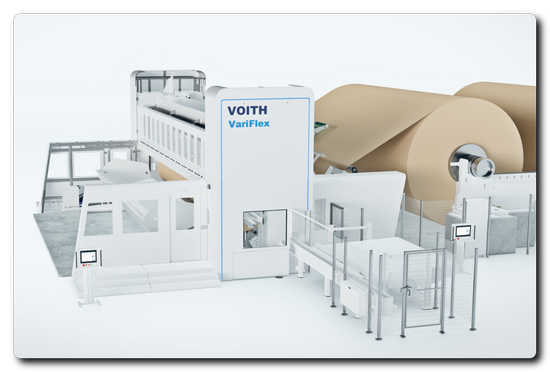 VariFlex Performance was developed to meet the highest customer requirements
VariFlex Performance was developed to meet the highest customer requirements
“With VariFlex Performance, Voith has developed a new high-capacity winder that is designed from scratch to fulfill all customer demands. Consequently, this winder fully focuses on the best winding quality, reliability and maximum production,” says Christian Woelfel, Head of Application at Voith.
“VariFlex Performance is our foundation for implementing full digitalization and connectivity in the end section,” adds Daniel Juergens, Global Product Manager at Voith. “In combination with our upcoming developments in the end section, this winder is a central element to bring key features – such as predictive winding, fully automatic process communication and highest winder throughput – to the next level.”
State-of-the-art technology
The unique Gecko OneStep system ensures reliable start and end gluing. Further boosting of the winding performance is achieved with SmoothRun technology. This active drum dampening system significantly reduces paper induced vibrations, leading to an increased capacity as well as brilliant winding results.
Innovative and user-friendly automation system
Live condition monitoring and a clear system analysis are features of the automation system. In addition, the system provides an easy data exchange to the mill system and enables the integration of automatic jumbo roll identification.
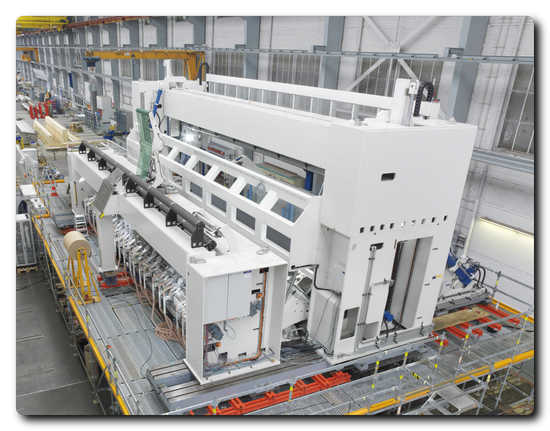 Before delivery, the two-drum winder is extensively tested at Voith
Before delivery, the two-drum winder is extensively tested at Voith
Short assembly and start-up time
VariFlex Performance will be delivered in only five main assembly modules. All modules are placed on common foundation rails, which simplifies alignment work as well as the civil engineering process. Voith handles the entire setup. Thorough in-house testing ensures that the system operates reliably right from the beginning.
For more information about VariFlex Performance, visit the Voith website: www.voith.com/variflex-performance
About the Voith Group
The Voith Group is a global technology company. With its broad portfolio of systems, products, services and digital applications, Voith sets standards in the markets of energy, oil & gas, paper, raw materials and transport & automotive. Founded in 1867, the company today has more than 19,000 employees, sales of € 4.2 billion and locations in over 60 countries worldwide and is thus one of the large family-owned companies in Europe.
The Group Division Voith Paper is part of the Voith Group. As the full-line supplier to the paper industry, it provides the largest range of technologies, services, components and products on the market and offers paper manufacturers solutions from one single source. The company’s continuous stream of innovations takes papermaking to the next level and facilitates resource-conserving production. With its Servolution concept, Voith offers its customers tailored service solutions for all sections of the production process. Voith Papermaking 4.0 ensures that equipment is optimally connected, while the secure use of generated data enables paper manufacturers to improve plant availability and efficiency.
Stora Enso explores recycling of paper cups for magazine paper production
Stora Enso aims to start recycling used paper cups on a large scale at its Langerbrugge Mill in Belgium. Based on production trials, Stora Enso possesses the technical feasibility to recycle paper cups for use in other paper applications. Stora Enso is now looking into partnerships for the collection and sorting of used paper cups to ensure that this high-quality fibre material is captured and given a second life.
Recycled fibre is an important raw material for Stora Enso as it is aligned with the company’s commitment towards a renewable and circular business. The paper board for cups is made of high-quality, renewable fibres, which can have several lives due to recycling. Recycling a paper cup can reduce its life cycle carbon footprint by half. Stora Enso sees this as an opportunity for driving more effective paper cup recycling by developing circular models with partners across the value chain.

“With efficient recycling processes, food service companies using wood fibre-based cups can improve their environmental footprint. Recycling must be made easy for consumers, that is why we want to invite partners and customers to jointly develop business models for collecting paper cups,” says Annica Bresky, Executive Vice President of the Stora Enso Consumer Board division.
In recycling trials at Langerbrugge Mill, half a million baled post-consumer paper cups collected from fast food restaurants and coffee houses were re-pulped and recycled into magazine paper. The result confirmed that paper cups can be recycled at the mill without any additional process equipment, and that the fibres are well suited for other paper applications, such as magazine paper production.
Stora Enso’s Langerbrugge Mill is one the largest paper mills in Europe, producing 540 000 tons of recycled newsprint and magazine papers annually. The production is exclusively based on paper for recycling. The mill is conveniently located in Continental Europe with about 80 million people living within 300 kilometres of the mill, thus providing a large enough source for recycled raw materials.
“We see paper cups as a valuable raw material for our process. Used paper cups provide a potential source of high-quality fibre for the production of magazine paper. Langerbrugge Mill has the technical readiness to accept billions of used cups for recycling within our sourcing area. The challenge is more about getting these cups to us on the industrial scale that our production would require,” says Rik Van Bostraeten, Sourcing Manager, Multifuel & Business Innovation, Stora Enso Langerbrugge Mill.
As part of the bioeconomy, Stora Enso is a leading provider of renewable solutions in packaging, biomaterials, wooden constructions and paper globally. We believe that everything that is made from fossil-based materials today can be made from wood tomorrow. Stora Enso has approximately 26 000 employees in over 30 countries. Our sales in 2018 were EUR 10.5 billion. Stora Enso shares are listed on Nasdaq Helsinki (STEAV, STERV) and Nasdaq Stockholm (STE A, STE R). The company’s shares are traded in the USA as American Depositary Receipts (SEOAY). www.storaenso.com
Valmet to deliver second tissue production line to Faderco in Algeria
Valmet will supply a complete Advantage DCT 100HS tissue production line to Faderco in Algeria. The order also includes a rewinder and an extensive automation package including process and quality control solutions.
The order was included in Valmet's first quarter 2019 orders received. The value of the order will not be disclosed.
The new line will be installed at the company's mill, Warak, in Setif, Algeria. The start-up is planned for June 2020. Valmet has previously supplied an Advantage DCT100+ tissue line to the mill, started up in 2015.
The new tissue line will fulfill Faderco's need of new capacity for tissue products. The Warak mill currently produces baby diapers, sanitary napkins, adult diapers and tissue paper for the domestic market and surrounding countries. The new line will support Faderco's ambition to consolidate its position as the Algerian leader in the sector by reaching 35 percent of market share in 2019. With an addition of 30,000 annual tons, Algeria will move from importer to exporter of tissue products.
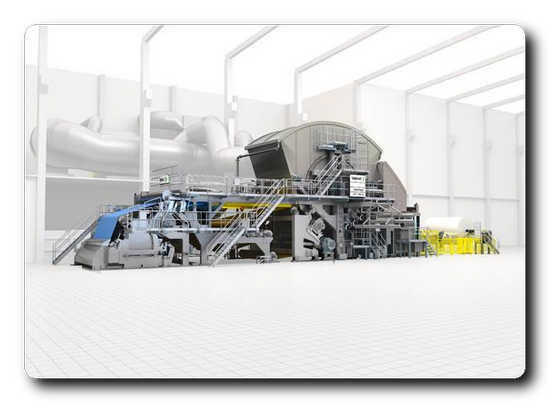 Valmet Advantage DCT 100HS tissue machine
Valmet Advantage DCT 100HS tissue machine
"The investment in Valmet's Advantage DCT technology, the new complex, will boost our production and support our ambition to reach the position as the 5th exporter in the Mediterranean region. We are already present in Morocco, Tunisia, Libya, Mauritania, Senegal, Togo, Mali, Guinea Conakry and Qatar, among others," says Amor Habes, CEO, Faderco.
"With this new, high-quality tissue making installation, we are very pleased to continue the journey together with Faderco; a journey which started in 2013. Valmet's leading Advantage DCT technology as well as it's Reelite ENS Winder will support Faderco's ambition for first class tissue paper production," says Bernhard Glifberg, Sales Manager, Tissue Mills Business Unit, Valmet.
Technical information about the delivery
The new tissue machine line will have a width of 2.8 m and a design speed of 2,000 m/min. It will add 30,000 tons tissue paper per year to Faderco's current production of tissue products.
Valmet's scope of delivery will comprise a complete tissue production line featuring bale handling, stock preparation system, the Advantage DCT 100HS tissue machine, a rewinder and auxiliaries. The tissue machine will be equipped with an OptiFlo II TIS headbox, a cast alloy Yankee cylinder, the Advantage technologies ViscoNip press, the AirCap hood and WetDust dusthandling systems as well as a F(O)CUS Rewinder with its unique ENS technology. The stock preparation line includes OptiSlush pulper, OptiFiner conical refiners and deflaker and OptiScreen technology.
The delivery also includes an automation package with the Valmet DNA process controls and Valmet IQ quality controls. Complete installation supervision, training, start-up and commissioning are also part of the delivery. The supply is based on total mill engineering by Valmet.
About the customer Faderco Warak
Faderco is an Algerian company active in the industrial hygiene field, through cotton derived products and hygiene items with absorbent pads. The company was founded in 1986 and became a joint stock company in 2009. Today, with more than 1,800 employees, 11 brands in 7 strategic business areas and 2 subsidiaries, Faderco continues to strive for a well-established international ambition.
The company produces baby diapers, adult diapers and paper products in the industrial Complex at Setif, opened in July 2012. In addition, the company has another production facility in Algiers. With both wholesale and direct sales, Faderco's commercial coverage is 80% of the Algerian national territory. The company exports products to other countries in Northwest Africa and sub-Sahara.
Valmet is the leading global developer and supplier of process technologies, automation and services for the pulp, paper and energy industries. We aim to become the global champion in serving our customers.
Valmet's strong technology offering includes pulp mills, tissue, board and paper production lines, as well as power plants for bioenergy production. Our advanced services and automation solutions improve the reliability and performance of our customers' processes and enhance the effective utilization of raw materials and energy.
Valmet's net sales in 2018 were approximately EUR 3.3 billion. Our more than 13,000 professionals around the world work close to our customers and are committed to moving our customers' performance forward - every day. Valmet's head office is in Espoo, Finland and its shares are listed on the Nasdaq Helsinki.
Minerals Technologies Signs Agreement with Century Pulp & Paper to Install and Operate a 45,000 Metric Ton Per Year Satellite PCC Plant in India
Minerals Technologies Inc. (NYSE: MTX) (“MTI” or “the Company”) has just announced that it has signed an agreement with Century Pulp & Paper, Division of Century Textiles and Industries Limited, to install a 45,000 metric ton per year satellite precipitated calcium carbonate (PCC) plant at its paper mill in Lalkuan, District Nainital, India. The facility is scheduled to begin operation in the second quarter of 2020.
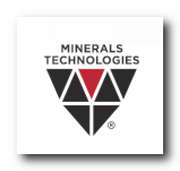 “We are very pleased that Century Pulp & Paper has selected Minerals Technologies to install and operate a satellite PCC plant that will provide our technology for their paper machine,” said Douglas T. Dietrich, Chief Executive Officer. “We look forward to a long and mutually rewarding relationship with this excellent paper company.”
“We are very pleased that Century Pulp & Paper has selected Minerals Technologies to install and operate a satellite PCC plant that will provide our technology for their paper machine,” said Douglas T. Dietrich, Chief Executive Officer. “We look forward to a long and mutually rewarding relationship with this excellent paper company.”
D.J. Monagle III, Group President, Specialty Minerals and Refractories, commented further, “Century Pulp & Paper is an innovative paper company, and we are thrilled that they have confirmed the value of our PCC technology in their fine paper grades. Our PCC will be used as a paper filler to improve brightness, opacity, bulk and to reduce the cost to the papermaker of higher-cost fiber. This represents our sixth facility in India and continues our geographic growth in Asia.”
PCC is a specialty pigment for filling and coating high-quality paper. By substituting Minerals Technologies' PCC for more expensive wood fiber, customers are able to produce brighter, higher quality paper at lower cost. In 1986, Minerals Technologies originated the satellite concept for making and delivering PCC on site at paper mills and the concept was a major factor in revolutionizing papermaking in North America. Today, MTI has nearly 60 satellite plants in operation or under construction around the world and continues to lead the industry with consistent quality and technical innovation.
About Minerals Technologies Inc.
New York-based Minerals Technologies Inc. (MTI) is a resource- and technology-based growth company that develops, produces and markets worldwide a broad range of specialty mineral, mineral-based and synthetic mineral products and related systems and services. MTI serves the paper, foundry, steel, construction, environmental, energy, polymer and consumer products industries. The company reported sales of $1.808 billion in 2018. For further information, please visit our website at www.mineralstech.com. (MTI-G)
Companies lose millions by side-lining procurement teams, research shows
Businesses failing to use procurement specialists to ensure they get best value from Third-Party Logistics suppliers (3PLs) are potentially losing millions, according to the latest research from leading supply chain and logistics consultancy SCALA.
SCALA surveyed a selection of the UK’s best-known businesses and 3PLs (whose revenue runs into the billions and whose number of clients run into the thousands) with regards to how 3PLs are selected, contracts negotiated, and the success of logistics partnerships maintained.
At each stage, the findings revealed that procurement specialists were being sidelined by logistics teams to the detriment of the effective running of their business.

At selection stage, 32% of companies admitted that procurement teams weren’t the main driver or didn’t play a significant role in the process.
A shocking 94% of companies also admitted that procurement teams never, or only occasionally, played a role in contract maintenance.
John Perry, managing director at SCALA, commented: “The findings of our research are made even more concerning by the fact that so few companies are satisfied with the performance of 3PL relationships.
“For example, only 9% of companies are very confident that they got the best deal when negotiating their contract with a 3PL. Also, less than a third (29%) believed that contracts remained appropriate or effective throughout a typical 5-year term.
“Despite these factors, too many companies are still failing to give specialist procurement teams a proper role within the process.”
SCALA’s research went on to show the positive impact good procurement has when used effectively. Companies reported that using procurement throughout the selection and negotiation process delivered cost reductions, improved KPIs, better contractual terms and a clear method for monitoring and maintaining ongoing performance of the 3PL.

Similarly, during the running of the agreement, effective procurement was found to have led to improved performance, better relationships and the avoidance of conflict between companies and their 3PL partners.
John continues: “Leadership teams could potentially save millions in lost efficiencies and unnecessary costs by ensuring the effective integration of procurement teams with logistics.
“The inconvenient truth is that both departments often view each other with (at best) confusion or (at worst) outright hostility. It is rare for one to have a detailed knowledge and appreciation of the other’s work, and yet, this is what delivers the best outcomes.
“It’s key to get both teams talking the other’s language. Alternatively, use a combined procurement and logistics consultant that can ensure maximum efficiency is created and maintained.”
Perhaps the best argument for better procurement is the response of the 3PLs themselves. Those expressing concerns about the enhanced use of procurement teams talked about more exacting KPIs (40%) or the penalisation of performance failures (30%). However, they also admitted that effective procurement did deliver improved performance and dispute resolution for both parties’ mutual benefit.
Participating companies that offered up their views in SCALA’s research cover a wide-range of sectors but predominantly operate in the grocery, FMCG, electrical appliance and homewares sectors. The 3PLs range from regional providers to the very largest in the UK, with the majority having in excess of 100 clients.
To download the report please visit this link
About Scala
SCALA is a leading international consultancy based in the UK, which specialises in procurement, supply chain, logistics and customer service, and provides independent and objective expertise.
We have gained an excellent reputation working with major clients in the grocery and FMCG sectors to drive supply chain improvements, deliver business benefits and enable business strategies and objectives to be successfully achieved.
SCALA has an experienced, knowledgeable and passionate team, whose approach is to work in partnership with our clients. It combines external knowledge, expertise and innovation with clients’ own business understanding to deliver solutions agreed by the whole team.
Valmet to supply key board machine technologies to Kraft of Asia Paperboard & Packaging in Vietnam
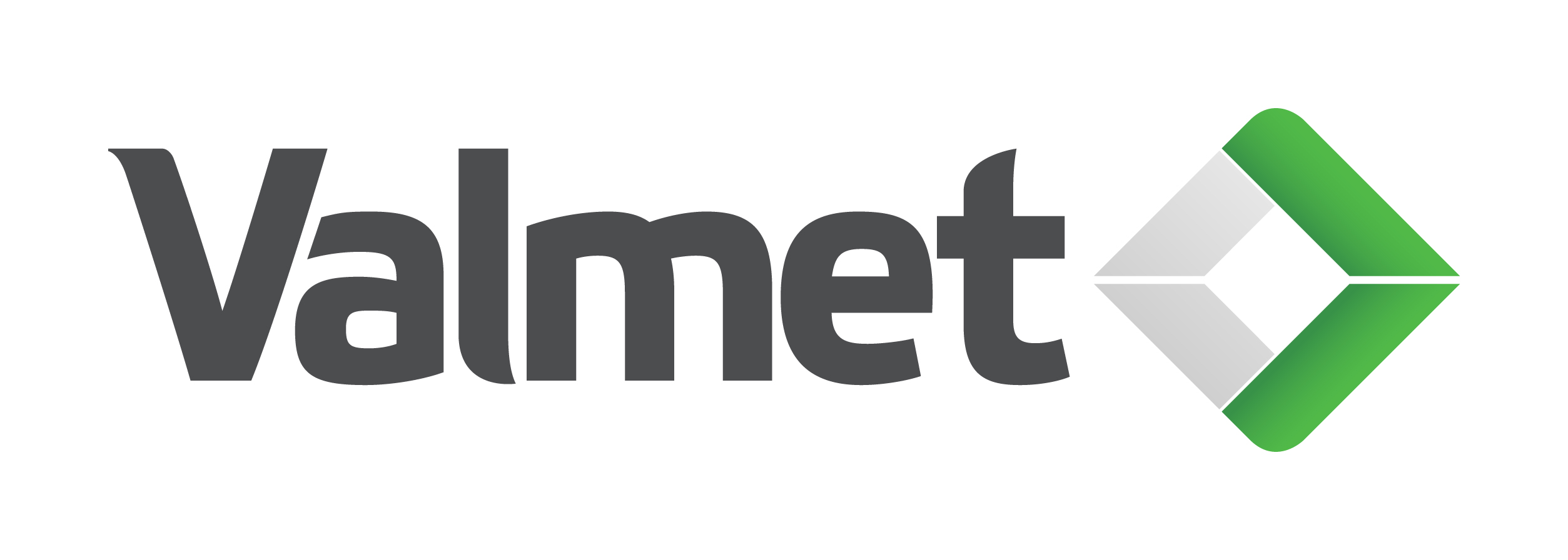
Valmet will supply key board making technologies to Kraft of Asia Paperboard & Packaging for its new containerboard making line, which will be located in Phu My, Vietnam.
The order was included in Valmet's orders received of the first quarter 2019. The value of the order will not be disclosed.
Kraft of Asia Paperboard & Packaging is a new company established by Marubeni Corporation (Marubeni). By establishing the new company with a new board production line (PM 1), Marubeni aims to proactively expand its containerboard business in the growing Vietnamese market. Kraft of Asia Paperboard & Packaging has received the permits for one million ton annual capacity and the company plans to invest in three board machines in the following 10 years. The start-up of the first machine (PM 1) is scheduled for the second half of 2020.
Technical details about the delivery
Valmet's delivery will include three OptiFlo Foudrinier headboxes for excellent profiles and good formation, and an OptiPress Linear press section to achieve excellent end product properties, high dewatering capacity and good runnability. The delivery will also include a start-up package of spare parts and consumables.
About the customer Kraft of Asia Paperboard & Packaging
Kraft of Asia Paperboard & Packaging Co., Ltd. (KOA), is a new company established by Marubeni to start a containerboard manufacturing and packaging material sales business in Vietnam. Marubeni is engaged in importing, exporting and trading of domestic and overseas products and commodities, and also in production activity in various business fields. In pulp and paper business, Marubeni also operates afforestation and produces woodchip, pulp, printing & writing paper and containerboard all over the world.
Valmet is the leading global developer and supplier of process technologies, automation and services for the pulp, paper and energy industries. We aim to become the global champion in serving our customers.
Valmet's strong technology offering includes pulp mills, tissue, board and paper production lines, as well as power plants for bioenergy production. Our advanced services and automation solutions improve the reliability and performance of our customers' processes and enhance the effective utilization of raw materials and energy.
Valmet's net sales in 2018 were approximately EUR 3.3 billion. Our more than 13,000 professionals around the world work close to our customers and are committed to moving our customers' performance forward - every day. Valmet's head office is in Espoo, Finland and its shares are listed on the Nasdaq Helsinki.
Read more www.valmet.com
2018 Global TIA winners and finalists turn ideas into profits
Good ideas become great solutions when they address problems in a novel way and yield tangible results. In line with the 2018 Global Technical Innovation Awards’ theme, ‘Thinking together’, the winning team from Sappi Maastricht Mill collaborated to bring about a packaging machine improvement that will impact our bottom line.
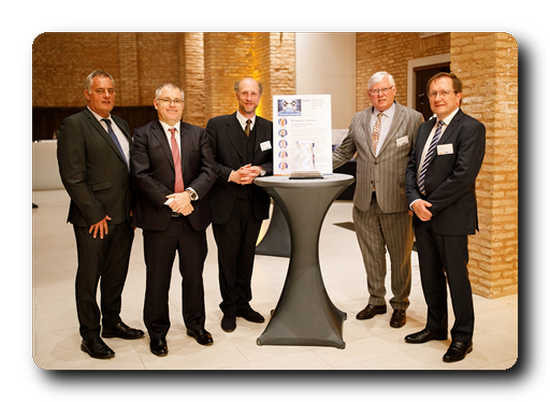 From left: Gary Bowles (Group Head Technology), Steve Binnie (CEO Sappi Limited), Tjerk Boersma (member of the Global TIA winning team) Berry Wiersum (CEO Sappi Europe) and Jos Daniels (member of Global TIA winning team).
From left: Gary Bowles (Group Head Technology), Steve Binnie (CEO Sappi Limited), Tjerk Boersma (member of the Global TIA winning team) Berry Wiersum (CEO Sappi Europe) and Jos Daniels (member of Global TIA winning team).
At the global awards ceremony held in Venice on 06 May 2019, Multilayer Headbox project team - Tjerk Boersma, Jos Daniels, Rob de Koning, Jean Peerlings and Peter Pijpers - were named the 2018 winners for designing a completely new ‘three layers in one headbox’ for paper board packaging that combines good printability with high bulk and good creasability.
This step-change technology was successfully applied to the rebuild of PM6, making Maastricht Mill the only producer worldwide to use this novel concept for its packaging product range. An added benefit is that it opens the possibility to develop other grades.
“With innovation must come delivery and successful management of concepts – from idea generation through to completion and a meaningful impact on our profitability,” said Sappi CEO Steve Binnie. He stressed that innovation is at the heart of Sappi’s strategy. No growth is possible without innovation. He reminded the audience that for Sappi, innovation is not an end in itself, but rather it must provide a sustainable, competitive advantage that will make a significant difference. He praised the excellent collaboration which the projects displayed, and encouraged even closer collaboration between R&D, Sales and Marketing, HR and all other functions.
Global TIA finalists
The powerful combination of innovative thinking, teamwork and turning a good idea into a workable solution, also led to success among our regional Global TIA finalists.
In Sappi North America, the team from Cloquet Mill, the SNA Technology Center and the SSA Technology Centre – Lester Li, Dan Menor, Nelson Sefara and Brad Yliniemi – developed a near-infrared technique to reduce pulp transition waste at Cloquet Mill.
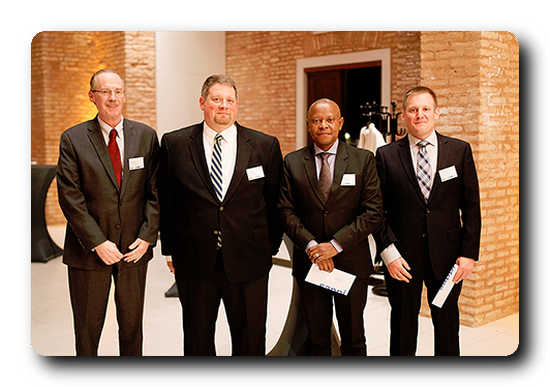 From left: Mark Gardner (CEO Sappi North America), Dan Menor (member of the Global TIA finalist team – Cloquet Mill, the SNA Technology Centre and the SSA Technology Centre), Nelson Sefara (member of the Global TIA finalist team – Cloquet Mill, the SNA Technology Centre and the SSA Technology Centre), Brad Yliniemi (member of the Global TIA finalist team – Cloquet Mill, the SNA Technology Centre and the SSA Technology Centre). Not pictured: Lester Li.
From left: Mark Gardner (CEO Sappi North America), Dan Menor (member of the Global TIA finalist team – Cloquet Mill, the SNA Technology Centre and the SSA Technology Centre), Nelson Sefara (member of the Global TIA finalist team – Cloquet Mill, the SNA Technology Centre and the SSA Technology Centre), Brad Yliniemi (member of the Global TIA finalist team – Cloquet Mill, the SNA Technology Centre and the SSA Technology Centre). Not pictured: Lester Li.
In South Africa, regional winning team from Tugela Mill - Ricky Singh and Ernst Vos - managed to increase neutral sulphite semi-chemical (NSSC) digester capacity to meet the growing demand for the mill’s Ultraflute product.
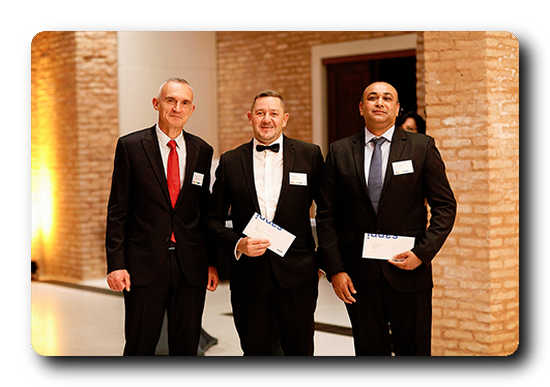
“The global marketplace – together with existing and future customers – makes it an absolute necessity to drive innovation that creates value and continued sustainability,” said Gary Bowles, Group Head Technology. “The finalists for 2018 reflect the breadth of topics that innovation covers at Sappi. The 2018 TIA finalists have contributed to these goals by developing products and processes with exceptional qualities in line with our values. Well done and thank you for contributing to Sappi’s success.” He also indicated that a pilot project will be launched to expand the drive for innovation in Sappi beyond technical innovation, to ensure that we capture even more opportunities in a rapidly changing world.
Other TIA finalists in each of the regions were:
Europe
- The Material flow forecast team from Gratkorn Mill - Franz Fleck, Walter Fulterer, Kadvael Le Boulch Rauno Timperi and Eric Zeyringer
- The CTMP refiner segments team from Lanaken Mill – Jajal Alajdi El Idrissi and Frans Rondags
North America
- The McCoy Gift Card team from Cloquet Mill and the SNA Technology Center – Barry Beyer, Nikki Colborn, Ken Jewett and Jeff Whittum
- The Odin project team (fibre reductions on text weights) from Cloquet Mill and the SNA Technology Center - Jessica Adams, Brad Browers, Joe Fernandez, Raynelle Meseroll and Jeff Whittum
South Africa
- Project Rufus and Ngodwana Mill and the SSA Technology Centre – Berdine Coetzee, Hunphrey Landman, Rendani Madula, Sanet Minnaar and Johann Wauts
- The PM2 project improvements team from Tugela Mill – JP Cillie, Devan Perumal and Atish Singh
